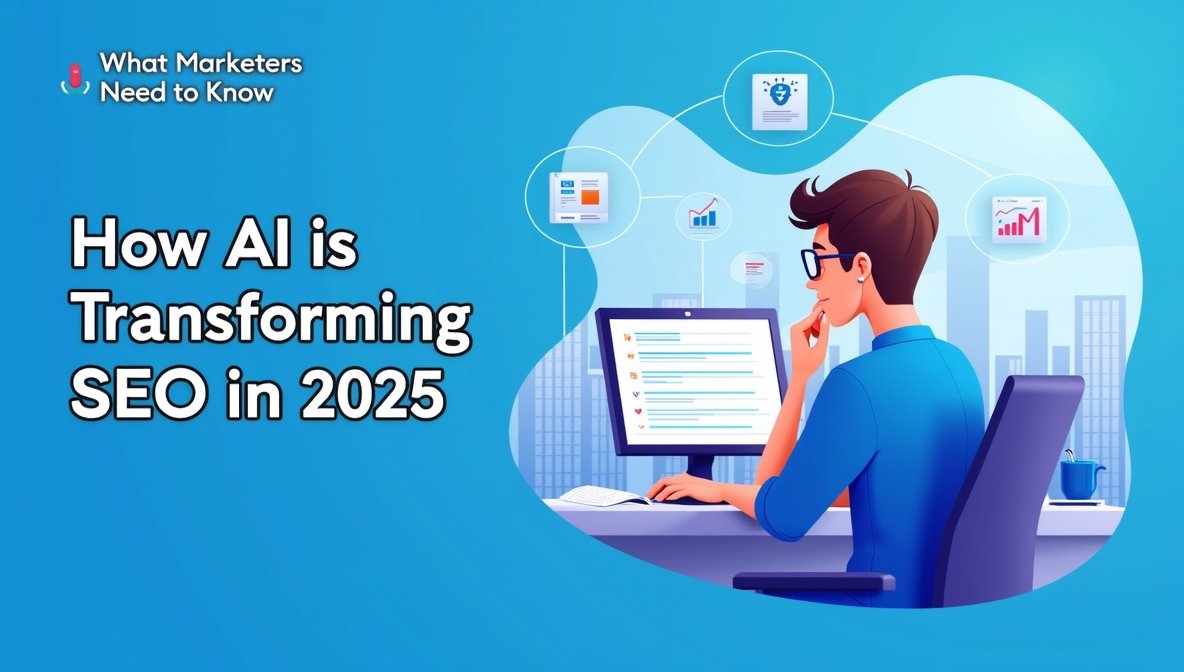Search engine optimization (SEO) is no longer what it used to be a few years ago. As technology evolves, so do search engine algorithms, user behaviors, and optimization strategies. In 2025, one of the biggest forces reshaping SEO is Artificial Intelligence (AI). From content creation to keyword research, link-building, and user experience-AI is rapidly becoming a game-changer for digital marketers.
In this blog, we’ll explore how AI is transforming SEO, what new opportunities it presents, and how you can stay ahead in this AI-powered SEO landscape.
What is AI in SEO?
Artificial Intelligence in SEO refers to the use of smart algorithms, natural language processing (NLP), and machine learning to automate, analyze, and optimize digital content for better visibility on search engines.
Google’s algorithm itself uses AI models like RankBrain, BERT, and MUM to better understand user intent and context. SEO professionals now need to use similar AI tools to optimize content and ensure it aligns with what search engines are prioritizing.
1. Smarter Keyword Research with AI
Traditional keyword research relied heavily on manual tools and guesswork. In 2025, AI tools like Surfer SEO, Clearscope, MarketMuse, and ChatGPT help marketers:
- Discover long-tail and conversational keywords
- Predict keyword difficulty and ranking potential
- Analyze competitors’ keyword strategies
- Suggest clusters and semantic variations
AI doesn’t just give you keywords; it gives you contextual keyword insights, helping you build content that answers the user’s query with relevance and depth.
2. AI-Powered Content Creation & Optimization
Content is still king—but now, it needs to be data-driven and user-intent focused.
AI tools can help you:
- Generate first drafts of blog posts
- Create SEO-optimized meta titles and descriptions
- Identify gaps in existing content
- Suggest internal linking strategies
- Analyze readability, tone, and semantic structure
Platforms like Jasper, Writesonic, and even ChatGPT allow marketers to create high-quality content at scale, saving time and increasing consistency.
Tip: Human editing is still critical. Use AI as a tool, not a replacement.
3. AI in Technical SEO
AI and machine learning also assist in technical SEO, helping digital marketers improve:
- Site speed and performance
- Crawlability and indexing
- Structured data markup
- Mobile usability
AI-based site audit tools like Screaming Frog, Sitebulb, and Deepcrawl now offer predictive insights, automatically flagging potential issues and suggesting fixes before they impact your rankings.
4. Enhanced User Experience (UX) Through AI
Google’s core updates increasingly focus on user experience metrics like page speed, dwell time, mobile responsiveness, and Core Web Vitals.
With AI-driven personalization and behavior tracking, marketers can now:
- Offer personalized content recommendations
- Predict user behavior through heatmaps and analytics
- Improve navigation based on user interaction data
- Use AI chatbots to enhance on-site engagement
By enhancing UX, websites not only retain users longer but also earn favor with search engines.
5. Voice Search & AI: The Future of Search Queries
With the rise of smart assistants like Alexa, Google Assistant, and Siri, voice search optimization is more critical than ever.
AI helps marketers optimize for:
- Conversational keywords
- Question-based queries
- Natural sentence structures
- Local “near me” searches
SEO strategy in 2025 must include voice-first content, FAQs, and schema markup to capture these fast-growing search formats.
6. Real-time SEO Insights with AI Dashboards
Gone are the days of waiting days or weeks for SEO performance reports. AI-driven dashboards like Google Looker Studio and SEMrush AI can now provide:
- Real-time ranking updates
- Predictive traffic trends
- Automated alerts for SERP changes
- AI-suggested content updates
This means you can adapt your strategy in real-time, rather than react after losing rankings.
7. Ethical SEO and the Role of AI
With great power comes great responsibility. As AI becomes more prevalent, Google is becoming stricter about quality and authenticity. Spammy AI-generated content or manipulative practices are easily detected and penalized.
Marketers should focus on:
- Transparency in content
- EEAT (Experience, Expertise, Authoritativeness, Trustworthiness)
- Ethical link-building
- Human oversight in all AI-driven tasks
Final Thoughts: Adapt or Fall Behind
AI is not replacing SEO it’s redefining it. The future of digital marketing will belong to those who know how to combine human creativity with AI efficiency. Whether you’re an agency, freelancer, or in-house SEO, it’s time to embrace AI tools and techniques to stay competitive.
Start small, experiment with AI SEO tools, and slowly scale your strategy. The earlier you adapt, the further ahead you’ll be when the next big Google update drops.
Need help with AI-powered SEO for your business?
Let our expert team craft a strategy that blends cutting-edge technology with proven marketing tactics.

